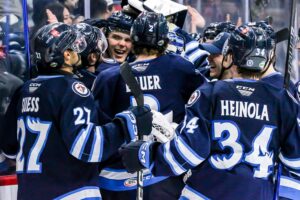by Garry McKay || AHL On The Beat Archive
From a Calder Cup winner to the goal that ended the longest game in American Hockey League history, Derek Wills has done the play-by-play for most of the great and a few not-so-great moments in Hamilton Bulldogs history.
The 31-year-old Port Colborne, Ont., native called his 500th consecutive regular-season game on Dec. 7, 2007, when the Hamilton Bulldogs beat the Binghamton Senators, 5-1, at Copps Coliseum. Wills has never missed a game since he joined the club in time for the 2001-02 season and his unbroken streak is the longest for any broadcaster in the league.
He is known for his meticulous pregame preparations for his broadcasts with notes on the players of both teams – cheat sheets if you will – that are so good and so detailed that other broadcasters have been known to borrow and copy them.
Wills started out as many broadcasters do learning the craft at a community TV channel. But it was ingenuity and perseverance that got him to the AHL.
When he found he was good at doing play-by-play Wills literally created his own job by buying airtime on several Niagara radio stations and then doing Golden Horseshoe Junior "B" Hockey League games. He sold ads for the games to cover his costs. That got him a foot in the door in the business and helped him gain the experience he would need to become a professional broadcaster.
By 2001, Wills knew he was ready for a big step and asked a friend, Larry Landon, executive director of the Professional Hockey Players’ Association, if he thought he should apply to do play-by-play of an International Hockey League team that was talking of starting up in Toronto. To Wills’ surprise Landon told him no.
“That summer I had contacted every ECHL and AHL team including the Bulldogs,” said Wills. “The Bulldogs receptionist told me they already had a play-by-play guy so I scratched them off the list. When I talked to Larry he told me that I didn’t want the Toronto IHL job, I wanted the Hamilton job. Even when I told him that they had turned me down he said ‘just trust me on this.”
It turned out Landon was right. The Bulldogs were looking to get their games on commercial radio. Until then they had had only occasional games on CHML or a regular schedule of games on Mohawk College radio which had very limited reach. When the Bulldogs approached CHSC in St. Catharines about doing their games they found that Wills held the broadcast rights to do any hockey on their station as part of the deal he had negotiated to do Junior "B".
Brian Lewis, who was then the team’s marketing director brought Wills in for an interview and they struck a deal.
“The deal that first year was the same as I had in Junior ‘B’,” Wills explains. “I owned the broadcast inventory and the Bulldogs paid me a small salary. I’m not a very good salesman and the only thing that saved me was that I was able to do a trade deal with Oscar Kichi, one of our owners who also owned the Ramada Hotel. He gave me a hotel room for the year and I was able to live there at no cost. At the end of that year I thought there was about a 50-50 chance that that was my last broadcast.”
The Bulldogs obviously liked what they heard, however, because it was by no means his last broadcast. They sweetened the pot and changed the arrangement so he would no longer have to try and sell the ads. He could instead concentrate on his broadcasts. And they have become so good that Wills was honored by the AHL in 2005 when he received the James H. Ellery Award for outstanding radio coverage of the league.
There were a couple of times that Wills thought his streak of consecutive games might be in jeopardy. Early in his first season Wills was late for the bus and then-coach Claude Julien left without him.
“It was early in the year and we had a game in Rochester and we stayed overnight there and were busing to Cincinnati the next day,” Wills explains. “The bus was scheduled to leave at 10 a.m. I went down at 9:45 and put everything on the bus except my laptop and my pillow and my blanket. I went back to my room to send my daily radio report and I was having a tough time getting it through. When I got back down the bus was gone. I could see it driving down the street.”
Wills had to catch a commercial bus to Cincinnati and arrived there 12 hours later only to find Julien waiting to lecture him in the hotel lobby.
“I thought I was going to get fired after we got back to Hamilton. I thought my radio career was over,” said Wills, who noted that he and Julien have since become good friends. “When Claude got hired in Boston I sent him an e-mail of congratulations. He e-mailed me back to thank me and ended it with, ‘Don’t miss the bus.’”
Wills can laugh when he recalls the bus story now. He still gets queasy, however, when he remembers the other time he came close to missing a game.
“I got food poisoning once in Hershey and I can remember it was a struggle to even get dressed,” said Wills. “I was calling the game and that was at the old Hersheypark Arena where you basically sat right in the stands. Every time I would go to a commercial break I would collapse on to the table and all the fans would yell over to me asking me if I was all right. Hershey won that game 1-0, which turned out to be a good thing because I didn’t have the energy to scream and yell about anything.”
How long Wills will run his streak is anyone’s guess. Like the players whose games he calls Wills goal is to eventually make it to the NHL. He came close to landing the New York Islanders’ play-by-play job a couple of years back.
Other than someday graduating to become the English play-by-play voice for the Hamilton Bulldogs’ parent club, the Montreal Canadiens, his ideal job would be to do the Buffalo Sabres games when Rick Jeanneret decides it’s time to hang up his microphone. After all, it’s Jeanneret’s enthusiastic style that has been the biggest influence on the way Wills calls a game.





































